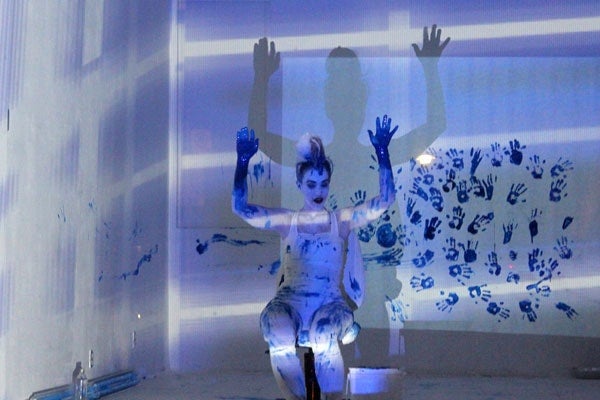
Drama Centre students invited to perform durational project in Berlin
Published: July 22, 2014
Stare.Print.Blue - Voyeuring the Apparatus is a durational performance-installation project produced by the University of Toronto’s Digital Dramaturgy Lab (DDL).
The project examines our relationship to time and technology. It explores elements of endurance and the movement of the body through time. And it explores the colour blue as it relates to our history and understanding of the world – particularly its appearance in most digital or technological devices.
In August 2013, Antje Budde, professor and associate director (graduate) at the Centre for Drama, Theatre and Performance Studies, and founder of the DDL, started work on Stare.Print.Blue. It debuted on October 5, 2013 at Videofag’s storefront as part of the renegade Le Rues des Refuses programming at Toronto’s Nuit Blanche Festival. Later this summer it will appear in Berlin at Survival, the International Performance Art Festival organized by Open Space Berlin.
Among Budde’s collaborators on the project were three U of T graduate students from the Centre for Drama, Theatre and Performance Studies: Myrto Koumarianos, Michael Reinhart and Nazli Akhtari.
Each student felt a different connection to the work depending on their input, but all three felt that this practical work was essential in enhancing the academic nature of their work in the graduate program and in the field of theatre.
Here they discuss Stare.Print.Blue and how participating in this exploratory piece was a means for combining both the academic and practical side of their work within the theatre program.
——————————————————————————————————————————————————
PhD student Koumarianos, who has worked with Budde on many occasions, is the performer in Stare.Print.Blue. She says the emphasis placed on duration and slowness with respect to time in the piece was intriguing.
“Whatever I did I needed to do it in slow motion,” says Koumarianos. “I had to find this fine balance between being ready to go and energetic, while remembering to move slowly. There was a rhythm to this piece that I could not break.”
She also notes that it was strange to experience elements of performance from both the point of view of the performer and the deviser. “I was essentially creating the piece and improvising; particularly towards the end,” adds Koumarianos.
Reinhart, a PhD student and Stare.Print.Blue’s choreographer, says he found the aspect of slowness just as difficult as Koumarianos.
“My role in the piece was to keep Myrto moving. It was interesting for me to watch the visual relationship we have to duration and time, and the frustration that can result from this,” says Reinhart.
Stare.Print.Blue’s emphasis on slowness was a challenge to perform because of how difficult it is to deliberately move our bodies so slowly. However, this wasn’t the only difficulty Kourmarianos faced.
Reinhart also discovered, while rehearsing and performing the piece, that other obstacles arise from working with technology in this way.
“I would find myself ready to perform but the technology wasn’t ready to go, so much of it required human attention, as did the analog chair that I performed with throughout the piece,” says Koumarianos.
Reinhart also mentions that, by performing the piece in Videofag’s storefront and subjecting Koumarianos to the critical gaze of the public, they were evoking the element ‘Stare’ that appears in the title.
“There was never a sense of certainty that you get with other pieces that you know are rehearsed over and over again,” says Akhtari, a master’s student and assistant on the project.
“You never knew how Myrto was going to respond to her environment, it was intriguing,” she adds.

The idea of altering our perception of time and reality is further played out with the final elements of the piece, ‘Print’ and ‘Blue’ as Koumarianos meticulously documents time by dipping her hands in a bucket of blue paint and imprinting them on a wall.
“The documentation of time with the blue handprints on the wall was something I really connected with as it was ‘screwing’ with time in a way that forced the audience to look at it through a different frame,” says Akhtari.
The painstaking movements of the performance confront the viewers’ expectation of time and duration while the blue handprints reference the blue glow of the digital devices that have become so familiar to so many. The coupling of these contradictions, the slow movement of the body versus the instantaneity of the digital accentuated the accelerated experience of our everyday lives.
Although ‘Blue’ emphasizes documentation and time, for Koumarianos it also represents joy and relief.
“When I got to the bucket of blue paint it was pure joy,” she says.
“The tactile nature of the paint, the fact that it was cool to the touch, was so inviting after working and becoming entranced in the stark whiteness of the space.”
The students also said that working on Stare.Print.Blue was a great opportunity to practice their craft, to learn the theory behind theatre and performance and to work in partnership with programs such as U of T’s Knowledge Media Design Institute and the Digital Media Program at York University.
“This is a really exciting time to have pieces come out of the Drama Centre that are more exploratory in nature,” says Reinhart.
Budde, Reinhart and Koumarianos are currently in Berlin preparing for the festival. Their participation is partially funded by the German, European Research Study Fund of the Faculty of Arts And Science, University of Toronto and the Centre for Drama, Theatre and Performance Studies.
Rebecca Biason is a writer with the Centre for Drama, Theatre and Performance Studies. Kelly Rankin is a writer with University Relations at the University of Toronto.



